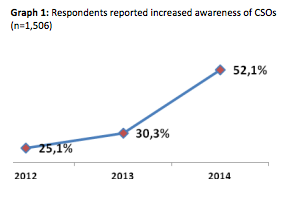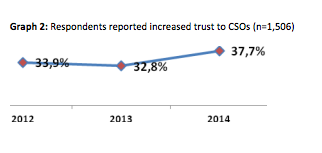Despite bigger citizens’ awareness of CSOs, the ability to draw funding and people remains poor

Following polling memo written by PACT, BelarusDigest issues overview of interrelations between Belarusans and civil society organisations.
According to a recently published report by the Independent Institute of Socio-Economic and Political Studies (IISEPS), Belarusans have become increasingly aware of the presence of civil society organisations.
IISEPS published findings based on polls, dating back to 2012, which focused at four categories: citizens’ awareness of civil society organisations; the level of citizens’ involvement in civil society activity; and the level of citizens overall public/social activism.
The results of the study show that Belarusans became more keen on the presence of civil society organisations in Belarus, with awareness jumping from 30% in 2012 to 52% in 2014. However, these figures are not as straightforward as they may initially appear. For one, rising awareness has not necessarily meant rising involvement.
Civil society organisations, by and large, have seen the most success coming from advocacy campaigns that utilise the Internet and social media networks. Despite their best efforts, their visibility still remains very low, as does the level of trust the Belarusan public affords them.
A more aware society
The study produced a number of interesting findings that indicate that Belarusans' civic consciousness is gradually evolving. Between 2012 and 2014, the number of Belarusans who are aware of civil society organisations (CSO), whether through participation in their activities or as recipients of their services, grew 27% - from 25% in 2012 to 52% in 2014.

The possible reasons for the hike in awareness listed by the study included a higher level of interaction and CSOs greater presence on both the streets and on social networks, and better communication and advocacy from civil society organisations.
Among the most popular of organisations are traditional state-run CSOs, like official trade unions. Gains in other areas were seen as well, though, with organisations on the local level witnessing a near doubling of awareness from only 15% to 29% since 2013. Awareness, however, does not mean that they more trusted. Overall only around 40% of those polled trust civil society representatives, with political parties fairing the worst.
According to the IISEPS study, despite their gains, CSOs in Belarus have failed to get more Belarusans directly involved in their activities. Participation in events has flat-lined over the past few years and most improvement has been seen in the overall percentage of citizens receiving services from CSOs.
Civil society's new approach
CSOs may be struggling to bring in more citizens to participate in their activities or utilise their services, but many of them are trying out new means of attracting citizens to their work. According to the report, the increased awareness about CSO activities may be partially attributed to a growing number of individuals who took party in charity-related activities, including online and crowd-funding platforms.
Some of their success can be attributed to the inclusive nature of their projects online which call for open public voting on what initiative a organisation should proceed with. Crowd-funding's growing popularity has allowed citizens to vote with their pocketbooks as well, with over 200 plus projects reportedly supported in the past year alone using this convenient mechanism.
While CSOs' web sites still reportedly lag behind in terms of their accessibility, the more accessible material they put out on popular social networks has raised the profile of their work. The growing number of Internet users have helped to make several advocacy campaigns, usually related to Belarusan culture and language, increase in popularity. Some of the more successful examples are the Budzma Belarusans! campaign, the open-air Jazz Festival and the Accessibility Campaign.

Other successful examples include Perspektiva, a public business association, who back in 2013 was able to get the Customs Union to delay the implementation of a prohibitively difficult and expensive quality assurance certification procedure.
Possible paths forward
The IISEPS also notes that other CSOs like think tanks and research organisations have been moving away from conducting analysis and surveys on abstract problems and moving towards bread and butter issues that communities can relate to. In particular, they have been focusing on local issues that effect specific regions in Belarus.
By utilising popular social media outlets and focusing on issues that the public feels directly affects them, there is a lot of potentially for successful advocacy campaigns and projects to be implemented. In December 2013, for example, streams of drivers arrived in Minsk to protest a new vehicle tax that would be levied against both private individuals and businesses. The protest and a subsequent petition (which gathered around 80,000) was organised on social networks.
According to the study, CSOs will continue to need to avoid politically-oriented activities if they want to gather more citizens to their cause. Among the least popular CSO activities were public political protests, while the most popular form of civic engagement was involvement in charity events.
One of the other least popular CSO-driven activities was fundraising. The study by IISEPS states that a majority of their funding came from donors and, given the unpopularity of fundraising, there appears to be few alternatives for many civil society organisations at the moment.
Work to be done
Despite the gains CSOs have made in terms of public awareness of their activities, their ability to attract funding and citizens to support their work remains rather poor. The study concludes that CSOs will need to improve how they communicate their values and become more transparent and accountable in order to gain the trust of the public. They will indeed need to use the public's increased awareness about their activities to simultaneously push for Belarusan society to place more trust in them.
The positive feedback surrounding their shift towards dealing with local issues has given them some indication of where they might be most effective in the future. Their ability to reach the public via social networks, especially CSOs not overseen by the state, is also very promising, but does have its limitations due to the gap in Internet usage between different demographics.
While the scope of their activities will likely remain decidedly unpolitical in nature, due as much to political pressure from above as adverse attitudes from the public, there is plenty of other important gaps that CSOs can fill in society. Both donors and CSOs alike should look at the areas where there has been notable success and model the projects they support to meet the actual needs of Belarusans.
-
03.01
-
07.10
-
22.09
-
17.08
-
12.08
-
30.09



























